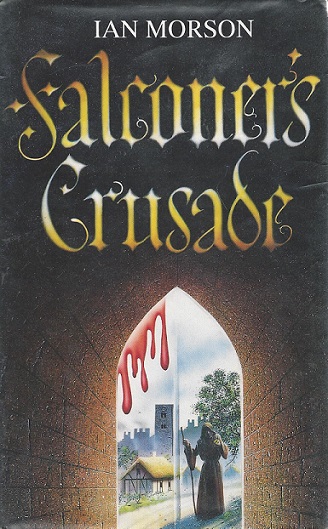 1264, Oxford. The barons of England, led by Simon De Montfort, are gathering their forces to rise up against King Henry III. With both parties vying for the support of the University, the fate of the country hangs in the balance.
1264, Oxford. The barons of England, led by Simon De Montfort, are gathering their forces to rise up against King Henry III. With both parties vying for the support of the University, the fate of the country hangs in the balance.
Regent Master William Falconer, a logician of the Aristotlean school, is welcoming a new student, Thomas Symon, to his classes. But when a servant girl is brutally killed, Thomas barely escapes a lynch mob alive. As the town rises up against the university, Falconer has to find a brutal and cunning murderer – before the death count continues to rise.
I encounter Falconer recently in one of the better sections of The Tainted Relic and was very much looking forward to meeting him again in this, the first of eight books (so far). Of course, I’m biased as we’re visiting THE University, as far as I’m concerned. And possibly in the most important year, 1264, because that was when THE college, Merton College, was founded. But does that get a mention in the book? Absolutely not! What a disgrace! So, bearing this cardinal omission in mind, could I possibly give this book a fair hearing?
Well, it’s pretty hard not to. This is one of the best medieval mysteries I’ve read in a long time.
Very much in the same vein as Paul Doherty and Peter Tremayne, this is an impressive blend of traditional mystery and an historical setting. Medieval Oxford, complete with town vs gown infighting and persecution of the Jewish population from both sides, is brought effectively to life. The life of a Medieval university – up at 6 am, only speaking Latin at breakfast – is fascinating and Iam Morson makes full use of the historical baronial uprising as part of the plot – both Prince (soon to be King) Edward and Simon De Montfort make appearances.
As for the mystery, while the killer isn’t a massive surprise – certainly as the book progresses, certain suspects tend to eliminate themselves – it is well-clued, with some of the clues appearing early on. The characters are well represented, Falconer being ably assisted by the impetuous Thomas and the more direct (but not stupid) Constable Bullock. There’s a lovely bit will Bullock where someone tries to take advantage of him, and he immediately spots this and goes straight to Falconer.
It’s an interesting choice to make Falconer very short-sighted – mainly as it proves to be a hindrance for a part of the book, which is fair enough, but there are other times when you feel it should be a problem and it isn’t mentioned.
Ignore this minor niggle though – this is a very enjoy book in my series of Medieval Miscreants reviews. Highly recommended.

[…] Falconer’s Crusade by Ian Morson […]
LikeLike
[…] Morson is the third author on my hit list for the year. I reviewed the first book, Falconer’s Crusade last year and really enjoyed it and his contribution to The Medieval Murderer’s first book, The […]
LikeLike
[…] documented murder takes place in Oxford in 1264, forty-eight years into the reign of Henry III. William Falconer, as documented by Ian Morson, was on hand to sort that out, but Henry was clearly losing the plot […]
LikeLike